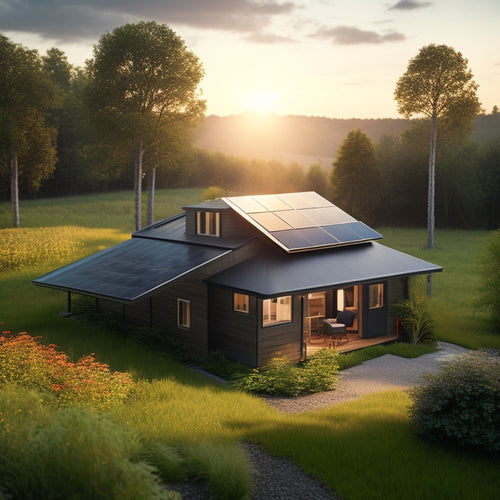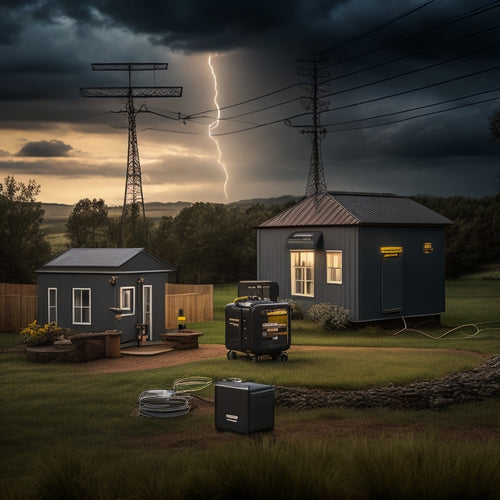
Top 3 DIY Panel Installation Kit Savings
Share
You can save up to 50% on solar panel installation costs by going DIY and choosing the right kit. Researching online for competitive pricing and kit features helps you prioritize high-efficiency solar panels. Opting for bundles like Standard (10% off), Premium (15% off), or Custom (20% off) can lead to significant discounts. Additionally, DIY installation kits eliminate labor expenses and include necessary materials, reducing additional purchases. By understanding key components and tailoring bundles to your project needs, you'll reveal further cost-saving opportunities - and exploring these strategies in more detail can disclose even more ways to maximize your savings.
Overview
- DIY panel installation kits offer significant savings, potentially up to 50%, by eliminating labor expenses.
- Bundling kits with necessary components can lead to 10-20% discounts, depending on the bundle type and size.
- High-efficiency solar panels in DIY kits optimize energy production and durability, reducing long-term costs.
- Accurate energy requirement assessment is crucial for system functionality and efficiency, ensuring maximum savings.
- Customizable kits allow for tailored savings by including only necessary components, avoiding unnecessary expenses.
Comparing Kit Prices Online
When shopping for a DIY panel installation kit, one of the first steps is to compare prices online.
You'll want to research various retailers and review their kit features, such as the type of panels, mounting hardware, and installation tools included.
Be sure to read customer reviews and testimonials to get a sense of the kit's quality and any potential issues.
Additionally, look for installation tips and tutorials provided by the retailer or manufacturer, as these can be useful resources when it comes time to install your panels.
Consider kits with high-efficiency solar panels that can provide ideal energy production, and look for systems designed to withstand harsh weather conditions for long-lasting performance.
Maximizing Savings With Bundles
Your DIY panel installation kit savings can add up considerably when you opt for bundles. By choosing a bundle, you're fundamentally buying in bulk, which can lead to significant discounts.
This approach also allows for kit customization, ensuring you get exactly what you need for your project.
Here's a breakdown of bundle savings:
| Bundle Type | Discount | Savings |
| Standard Bundle | 10% off | $100 |
| Premium Bundle | 15% off | $200 |
| Custom Bundle | 20% off | $300 |
Bulk purchasing through bundles is an excellent way to maximize your savings. Not only do you get a discount, but you also avoid the hassle of buying individual components.
With kit customization, you can tailor your bundle to fit your specific needs, further increasing your savings.
DIY Installation Cost Breakdown
By opting for a DIY panel installation kit, you've already taken a significant step in reducing costs.
When it comes to off-grid solar kits, the key components and sizing considerations such as accurate energy requirement assessment play an essential role in ensuring the system's functionality and efficiency.
Now, let's explore the DIY installation cost breakdown to see where you can save even more.
The biggest cost-saver is labor expenses – by doing it yourself, you're eliminating the need to pay a professional. This can save you up to 50% of the total installation cost.
Additionally, DIY kits often include all necessary installation materials, which means you won't have to purchase them separately. This can add up to significant savings, especially on larger projects.
Frequently Asked Questions
Can I Customize My DIY Panel Installation Kit?
You can definitely customize your DIY panel installation kit to fit your needs. You'll have access to custom design options, allowing you to incorporate personalized features that reflect your unique style and preferences.
Do DIY Kits Come With a Manufacturer's Warranty?
You'll be pleased to know that most DIY kits do come with a manufacturer's warranty, covering defects and ensuring your investment's protected. However, be aware of warranty limitations, as they may vary depending on the manufacturer and specific kit you choose.
Are DIY Panel Installation Kits Compatible With All Roofs?
You'll face installation challenges if your DIY panel kit isn't compatible with your roof material; make certain you choose a kit that accommodates your roof type, whether it's asphalt shingle, metal, or tile, to assure a successful and worry-free installation.
Can I Return Unused Kit Materials for a Refund?
You'll want to review the return policy before purchasing, as it varies by manufacturer; generally, you can return unused kit materials for a refund, but be prepared to provide proof of purchase and follow specific return procedures.
Are DIY Kits Suitable for Homes With Complex Rooflines?
You'll need to assess your roofline's complexity to determine installation feasibility; if you're comfortable managing roofline challenges, DIY kits can be suitable, but consider consulting a professional if you're unsure about tackling intricate installations.
Ready to Buy
You've got your DIY panel installation kit, and you're ready to save some cash. Don't let the upfront cost scare you off - with the right bundle and some elbow grease, you can install your panels without breaking the bank. Remember, the initial investment will pay off in the long run with lower energy bills and a smaller carbon footprint. So, roll up your sleeves and get to work - your wallet (and the planet) will thank you!
Related Posts
-

Diy Off Grid Solar
By embracing DIY off-grid solar, you can break free from grid dependence, slashing your energy bills by up to 90% and...
-

Key Components of a Reliable Emergency Power Supply System
A reliable emergency power supply system requires several key components. You need proven performance metrics to guar...
-

Top Camping Water Bottles for Adventure
When you're out adventuring, picking the right camping water bottle is essential for staying hydrated. Look for durab...


